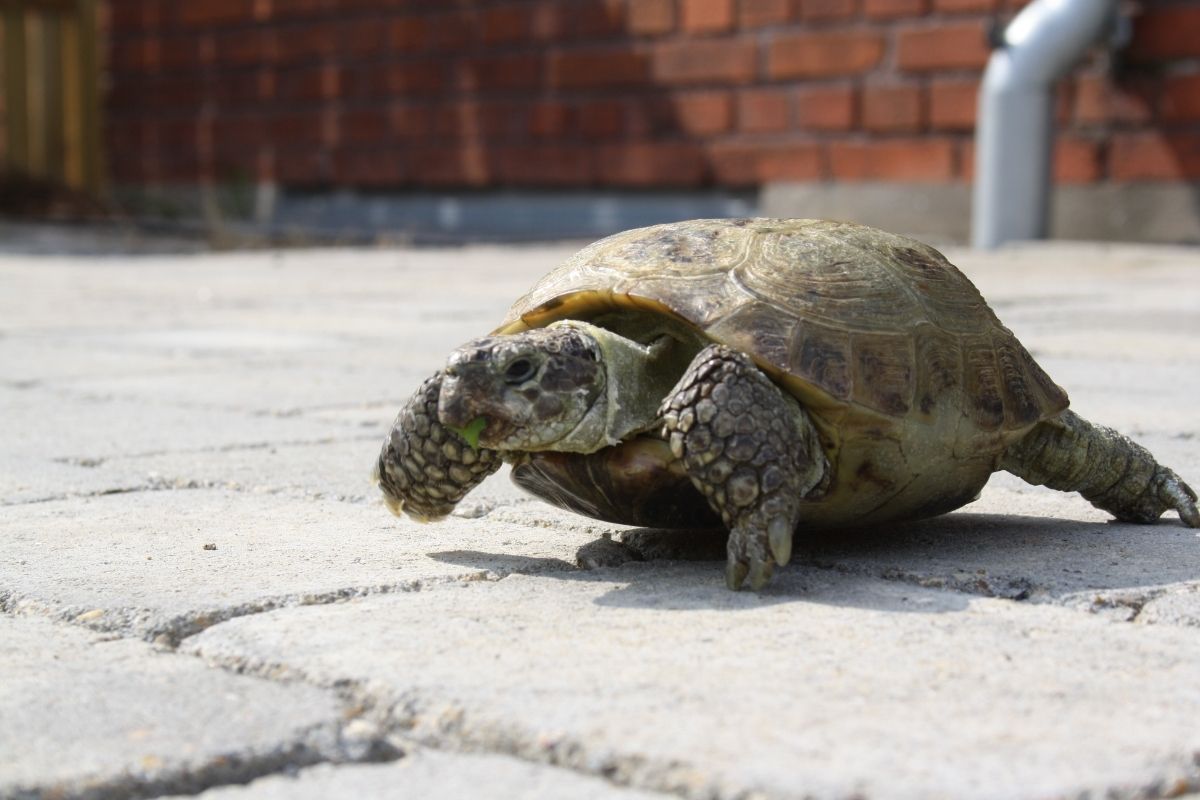Turtles are known for their intelligence, but they aren’t always considered as such. In fact, some scientists believe that turtles are smarter than humans. Is this true or false?
Turtles are reptiles belonging to the order Chelonia. They are characterized by having four legs, a shell, and a neck. The name turtle comes from the Latin word tortus meaning twisted.

Popularly known for being slow (Hare and the Tortoise anyone?), does this translate as a lack of brainpower, or does their sense of methodical calmness to movement mean they can operate at a higher capacity?
Are Turtles Actually Smart?
There are two main theories regarding the intelligence of turtles. One theory states that they are dumb animals who lack language skills. Another theory suggests that they are very intelligent creatures capable of learning new things.
There is no scientific evidence to support either claim.
Theory 1: Turtles Are Unintelligent Animals Who Lack Language Skills
Some people think that turtles have little brain power. However, there’s no proof that they can’t learn how to communicate with others. It’s possible that they just don’t know how to do it yet.
In one experiment, researchers put a group of turtles in an aquarium filled with water. A researcher then placed a small plastic ball on the bottom of the tank.
After a few minutes, the turtles began moving toward the ball. This shows that they were able to understand what was happening and where the ball was located.
Theory 2: Turtles Are Very Intelligent Creatures Capable Of Learning New Things
Another theory about turtles’ intelligence is that they are very smart. Some people say that turtles are more intelligent than other animals because they can adapt to different environments and survive in many places.
One study found that turtles could learn to recognize objects and remember them for up to three years later. Researchers also discovered that they could distinguish between similar objects. For example, they could tell the difference between wooden and stone blocks.
However, another study found that turtles cannot learn complex tasks like recognizing faces. Scientists think this may be because they need to see something happen several times before recognizing it.
As you can see, the jury is out on the overall intelligence levels of the Turtle, and further research is needed to test the validity of these theories. But how about some of the other areas of testing a turtle’s intelligence?
Is It True That Turtles Have Feelings?
While most people would assume that turtles and tortoises wouldn’t feel emotions, some studies suggest otherwise.
A team of researchers led by Dr. David Larkum at the University of Bristol tested whether turtles and tortoises could show signs of fear. They used a technique called “startle response” testing. When startled, the animal freezes momentarily and sometimes makes a noise.
They first exposed the turtles to a loud sound. Then, they played a video clip of a predator attacking a turtle. Finally, they showed the turtles a picture of a predator.
After each test, some of the turtles froze. This means that they had shown signs of fear.
Can Turtles Recognize Faces?
Scientists believe that turtles can recognize faces because they use facial recognition when choosing mates.
Researchers at the University of California, Berkeley, studied the way that male sea turtles choose mates. They noticed that males only chose females who looked familiar.
This suggests that they might be using facial recognition as a way to identify potential partners.
Can Turtles Understand Human Language?
Many people think that turtles are not capable of understanding human language. But scientists say that they can understand simple words and phrases.
For instance, they can respond to commands such as “come here.” In addition, they can follow directions. One scientist even trained a turtle to perform tricks. He taught the turtle how to play dead so he could get food.
The turtle learned quickly and performed the trick over and over again.
Can You Train Turtles?
Yes! In fact, you can train turtles and tortoises to perform certain tasks.
For example, scientists at the University of Texas at Austin trained a turtle named Muffin to walk across a treadmill. The researchers attached weights to her shell so that she couldn’t move around too much.
Muffin learned quickly and walked across the treadmill without any problems. She even did it while carrying food!
Other experiments have shown that turtles and tortoises can learn new skills. For example, scientists taught a turtle how to open its shell. They also taught a tortoise how to play a game of hide-and-seek.
Do Turtles Have Memory?
We know that an Elephant never forgets, but how about our beloved shelled creatures?
Well, we do not really know if turtles or tortoises have memory. However, one experiment has suggested that turtles have short-term memories.
The scientists from the University of California, San Diego, were interested in learning how long turtles could remember things. To find out, they placed turtles in a tank with two doors.
One door was covered with a red curtain, which meant that the animals could go through it. The other door was closed.
The scientists then put a treat on top of the red curtain. After the turtles went through the red curtain, they were allowed to eat the treat.
When the scientists opened the second door, they found that the turtles remembered where the treat was located. This shows that they had short-term memories.
What Are The Natural Instincts Of A Turtle?

Turtles are very social animals. They live together in groups called “clans.” Each clan is made up of several families.
There are three main types of family: parents, juveniles, and adults. Parents care for their offspring until they are old enough to fend for themselves.
Juveniles stay with their parents until they reach sexual maturity. Adults usually leave their clans after mating. Although all turtles are born with shells, they lose them once they grow into adulthood.
What About The Spatial Sense Of A Turtle?
Scientists have discovered that turtles use their sense of smell to navigate. When a turtle smells something, it uses this information to determine where it wants to go.
In one study, scientists kept turtles in tanks filled with water. Then they added different scents to the water.
Afterward, the scientists checked the turtles’ behavior. They found that the turtles moved toward the scent.
In another experiment, scientists used a maze to test whether turtles could detect the smell of food. They placed small pieces of food inside the maze. Then they tested the turtles by putting them in the maze and watching what happened.
They found that the turtles smelled the food and followed the scent to get to the food.
Frequently Asked Questions
How Do Turtles Sleep?
Like us, reptiles need to rest. Scientists at the University of Illinois at Urbana-Champaign discovered that turtles sleep for up to 10 hours a day! During their sleep periods, turtles curl up into a ball. Like us, they breathe slowly, snore, and make little noises.
What Is A Turtle’s Shell Made Of?
A turtle’s shell is made of calcium carbonate. It protects them from predators, such as sharks and crocodiles.
Why Are Turtles So Slow Moving?
The turtle moves very slowly because they are slow breathers. Their lungs take longer to fill with air than ours do.
Final Thoughts
Although we still need to research them more to learn about their ways of living, we can safely say that they remain one of the most loved reptiles on the planet!
